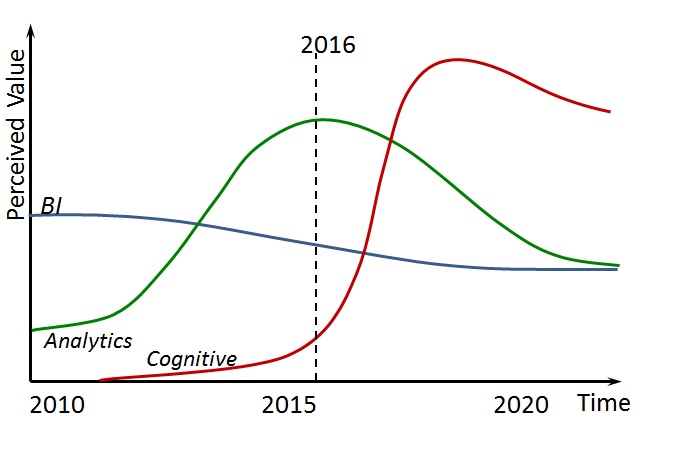
Where is Cognitive Decision Making in BI? (Part 3 of 3)
Cognitive computing brings together a wide range of disciplines and technologies to address complex situations filled with ambiguity and uncertainty. With so much to recommend it, why isn't it more ubiquitous in enterprise decision making?
- By Barry Devlin
- March 31, 2016
Michael Gonzales of Prolifics speaks specifically to business decision making using cognitive computing in Cognitive Computing: Transforming the Analytic Landscape: "Cognitive [c]omputing attempts to think like, and interact with, humans; essentially emulating the decision-making process humans undertake when considering complex problems in a changing landscape of data." Gonzales lists three key aspects:
- Augmenting human cognition in exploration and discovery
- Automating decision-making
- Continuous improvement through deep learning
He concludes that "it can be argued that artificial intelligence literally means business intelligence."
The last statement may be somewhat of an over-statement, but the argumentation otherwise makes perfect sense. As framed above, the three key characteristics clearly point to the possibility of applying this technology to decision making in business. Why haven't we?
Beyond the deep misunderstanding about context-setting information / metadata already discussed in Part 2 of this series, I believe that the divergence is due to the BI industry's fascination with the mechanics of big data rather than what can be done with it. This is, in turn, driven by the perceived value of the different technologies in the broad data/information landscape.
Figure 1 offers a conceptual view of how the perceived value of BI, analytics, and cognitive decision making has changed and will evolve over time. Traditional BI has already been supplanted by analytics in perceived value as the market has focused on the joy of correlating big data and the excitement of a much-hyped and, perhaps, over-egged shift in the technology from relational databases to the Hadoop menagerie. As vendors and analysts in the BI/big data market have focused on this epic battle, the emerging possibilities offered by cognitive computing to decision making have gone largely unnoticed. I expect that is about to change.
The perceived value of cognitive decision making might even surpass that of BI in the next year or so, particularly if a few interesting stories about cognitive decision successes emerge. I expect that as cognitive computing become pervasive, the perceived value of analytics will drop -- perhaps to that of BI -- as much of its use is subsumed by cognitive decision making.

Figure 1: The perceived value of different decision making support paradigms.
I have drawn the rise of perceived value of cognitive decision making as an extremely steep upward slope in Figure 1. This is, of course, my best guess, but it is based on two observations. First, deep learning and other aspects of cognitive computing based on neural networks require enormous parallel computing power using the traditional von Neumann hardware architecture. So far, this has made it the preserve of the largest data companies, such as Google and Facebook. However, the software required is being developed under the open source banner and is seeing wide use and development.
Second, a number of companies are developing neuromorphic chips that implement neural networks in hardware using miniscule amounts of power in comparison to traditional processors. IBM Research, for example, showed its TrueNorth/SyNAPSE hardware nearly two years ago. Its one million "neurons" are "capable of 46 billion synaptic operations per second, per watt -- literally a synaptic supercomputer in your palm." Yes, this is a tiny number of neurons compared to the brain, but each electronic neuron is processing data thousands of times faster than its biological counterpart.
Furthermore, if this scales well (and I have not seen later reports that address this), the implications are plain. Any task amenable to cognitive computing will be cheaply, rapidly, and comprehensively subsumed into the cognitive computing system.
Together, these two developments can be a trigger to bring cognitive decision making into the mainstream. I believe that this is imminent. It seems likely that operational BI decisions will be the first to be automated by cognitive decision making. After all, most operational BI decisions are conceptually much simpler than those required for driving which has already been demonstrated successfully. In the case of tactical BI and, particularly, strategic BI, the approach may be more about augmenting human decision making that automating it entirely.
However, the shift of decision making from humans to algorithms is already beginning. Given the pace of advance in the underlying technologies, I suspect it would be unwise to underestimate the possibilities that may emerge for cognitive decision making in the next few years.
Following his defeat by IBM Watson in Jeopardy! in 2011, champion Ken Jennings may have had tongue firmly in cheek when he commented in his final response: "I for one welcome our new computer overlords." How far wrong will he be by 2021?
About the Author
Dr. Barry Devlin is among the foremost authorities on business insight and one of the founders of data warehousing in 1988. With over 40 years of IT experience, including 20 years with IBM as a Distinguished Engineer, he is a widely respected analyst, consultant, lecturer, and author of “Data Warehouse -- from Architecture to Implementation" and "Business unIntelligence--Insight and Innovation beyond Analytics and Big Data" as well as numerous white papers. As founder and principal of 9sight Consulting, Devlin develops new architectural models and provides international, strategic thought leadership from Cornwall. His latest book, "Cloud Data Warehousing, Volume I: Architecting Data Warehouse, Lakehouse, Mesh, and Fabric," is now available.